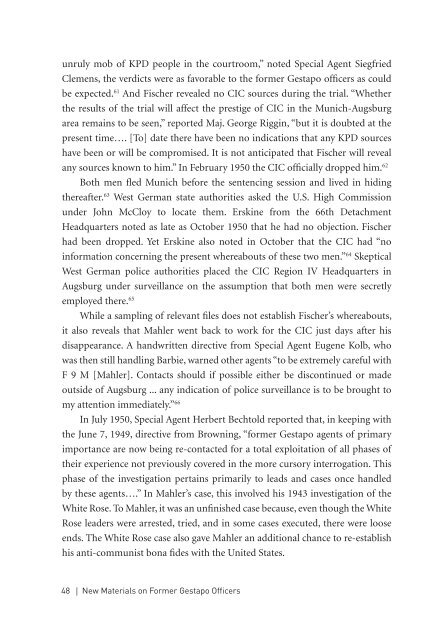hitlers-shadow
hitlers-shadow
hitlers-shadow
You also want an ePaper? Increase the reach of your titles
YUMPU automatically turns print PDFs into web optimized ePapers that Google loves.
unruly mob of KPD people in the courtroom,” noted Special Agent Siegfried<br />
Clemens, the verdicts were as favorable to the former Gestapo officers as could<br />
be expected. 61 And Fischer revealed no CIC sources during the trial. “Whether<br />
the results of the trial will affect the prestige of CIC in the Munich-Augsburg<br />
area remains to be seen,” reported Maj. George Riggin, “but it is doubted at the<br />
present time…. [To] date there have been no indications that any KPD sources<br />
have been or will be compromised. It is not anticipated that Fischer will reveal<br />
any sources known to him.” In February 1950 the CIC officially dropped him. 62<br />
Both men fled Munich before the sentencing session and lived in hiding<br />
thereafter. 63 West German state authorities asked the U.S. High Commission<br />
under John McCloy to locate them. Erskine from the 66th Detachment<br />
Headquarters noted as late as October 1950 that he had no objection. Fischer<br />
had been dropped. Yet Erskine also noted in October that the CIC had “no<br />
information concerning the present whereabouts of these two men.” 64 Skeptical<br />
West German police authorities placed the CIC Region IV Headquarters in<br />
Augsburg under surveillance on the assumption that both men were secretly<br />
employed there. 65<br />
While a sampling of relevant files does not establish Fischer’s whereabouts,<br />
it also reveals that Mahler went back to work for the CIC just days after his<br />
disappearance. A handwritten directive from Special Agent Eugene Kolb, who<br />
was then still handling Barbie, warned other agents “to be extremely careful with<br />
F 9 M [Mahler]. Contacts should if possible either be discontinued or made<br />
outside of Augsburg ... any indication of police surveillance is to be brought to<br />
my attention immediately.” 66<br />
In July 1950, Special Agent Herbert Bechtold reported that, in keeping with<br />
the June 7, 1949, directive from Browning, “former Gestapo agents of primary<br />
importance are now being re-contacted for a total exploitation of all phases of<br />
their experience not previously covered in the more cursory interrogation. This<br />
phase of the investigation pertains primarily to leads and cases once handled<br />
by these agents….” In Mahler’s case, this involved his 1943 investigation of the<br />
White Rose. To Mahler, it was an unfinished case because, even though the White<br />
Rose leaders were arrested, tried, and in some cases executed, there were loose<br />
ends. The White Rose case also gave Mahler an additional chance to re-establish<br />
his anti-communist bona fides with the United States.<br />
48 | New Materials on Former Gestapo Officers


